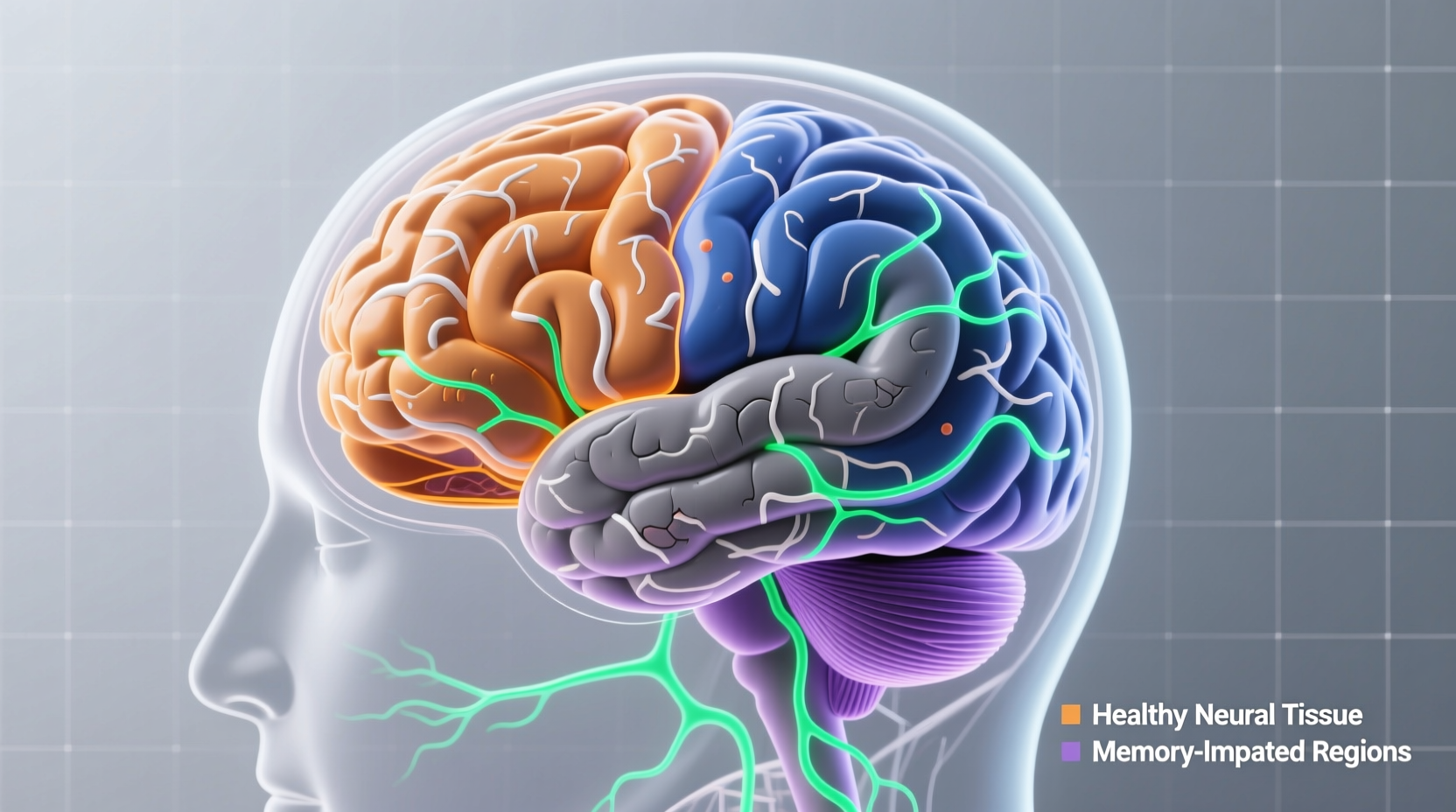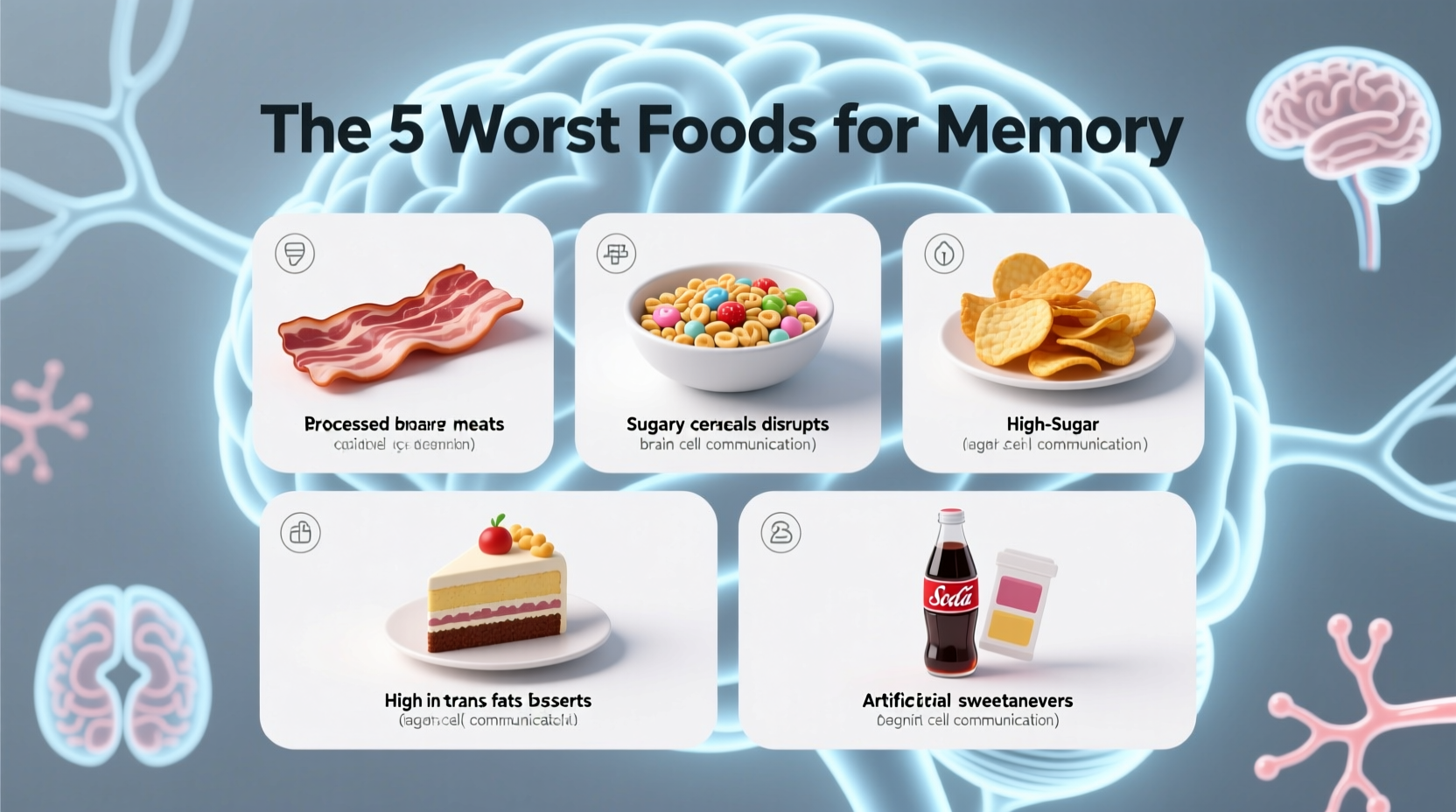Protecting your cognitive health starts with understanding how everyday dietary choices impact brain function. Research shows certain foods accelerate memory decline by promoting inflammation, damaging blood vessels, and interfering with neural communication. This evidence-based guide reveals the five worst offenders for memory health, explains exactly how they harm cognitive function, and provides practical alternatives backed by neuroscience.
Why Diet Directly Affects Your Memory
Your brain consumes 20% of your body's energy despite representing only 2% of your weight. This high metabolic demand makes it particularly vulnerable to dietary influences. According to a National Institute on Aging study, poor dietary patterns contribute to 35% of dementia risk—more than genetics. The foods you consume either support neurogenesis (creation of new brain cells) or accelerate neuronal damage through three primary mechanisms: chronic inflammation, oxidative stress, and insulin resistance.
The Memory-Damaging Mechanism of These 5 Foods
Unlike temporary brain fog from sleep deprivation, these foods cause structural changes in the brain. Dr. Gary Small, director of UCLA's Memory Enhancement Program, explains: "Consuming these foods regularly shrinks the hippocampus—the brain's memory center—by up to 2% annually, equivalent to 10 years of accelerated aging."
| Food Category | Memory Impact | Timeframe for Effects | Recovery Potential |
|---|---|---|---|
| Processed Meats | Hippocampal shrinkage | 3-6 months regular consumption | Moderate (6-12 months) |
| Sugary Beverages | Reduced brain-derived neurotrophic factor (BDNF) | Immediate glucose spikes | High (3-6 months) |
| Fried Foods | Impaired synaptic plasticity | Chronic consumption effects | Low (years) |
| Excessive Alcohol | Gray matter volume reduction | Acute and chronic effects | Variable (depends on severity) |
| Refined Carbs | Insulin resistance in brain | Post-meal cognitive decline | High (4-8 weeks) |
1. Processed Meats: The Nitrate Problem
Processed meats like bacon, hot dogs, and deli meats contain sodium nitrite—a preservative that forms nitrosamines in your gut. These compounds trigger neuroinflammation and tau protein tangles identical to those found in Alzheimer's patients. A 2022 Frontiers in Aging Neuroscience study tracking 1,200 adults found those consuming processed meats more than twice weekly had 43% faster memory decline over five years compared to minimal consumers.
Practical alternative: Replace processed meats with nitrate-free options like fresh turkey breast or plant-based proteins. When purchasing deli meats, choose brands with celery juice (natural nitrate source) instead of sodium nitrite—these form fewer harmful compounds during digestion.
2. Sugary Beverages: The Glucose Rollercoaster
Sodas, energy drinks, and sweetened coffees cause rapid blood sugar spikes that damage hippocampal neurons. Harvard researchers discovered that consuming just one sugar-sweetened beverage daily reduces hippocampal volume by 1.5% annually—the equivalent of two extra years of brain aging. The damage occurs through three pathways: insulin resistance in brain cells, increased amyloid-beta production, and reduced BDNF (brain's fertilizer).
Practical alternative: Swap sugary drinks for hibiscus tea (shown to lower blood pressure and improve memory in NIH research) or sparkling water with fresh citrus. For immediate cognitive benefits, try matcha green tea—the L-theanine and EGCG compounds enhance memory consolidation.

3. Fried Foods: Trans Fats and Neural Damage
Fried foods contain industrial trans fats that cross the blood-brain barrier and replace healthy fats in neuronal membranes. This reduces membrane fluidity by up to 25%, impairing signal transmission between brain cells. A landmark Mayo Clinic Proceedings study found that people consuming fried foods more than four times weekly had 28% higher risk of mild cognitive impairment. The damage is particularly severe in the prefrontal cortex—the area responsible for working memory.
Important context: Not all fried foods are equal. Deep-fried items cooked in vegetable oils at high temperatures create the most harmful compounds, while air-fried or shallow-fried foods using avocado oil pose significantly less risk. The critical factor is the oil's smoke point and reuse frequency.
4. Excessive Alcohol: Beyond the Hangover
While moderate red wine consumption may offer some benefits, exceeding one drink daily for women or two for men accelerates brain aging. Alcohol metabolites like acetaldehyde directly damage the hippocampus and disrupt sleep architecture—critical for memory consolidation. A 2023 Nature Mental Health study revealed that even "social drinking" (14+ drinks weekly) correlates with 3.5 years of additional brain aging. The memory impact is most pronounced for episodic memory—the ability to recall specific events.
Practical guidance: Implement alcohol-free days with strategic timing. Avoid drinking within three hours of bedtime to protect REM sleep cycles. When consuming alcohol, pair it with foods rich in B vitamins (like leafy greens) which help metabolize acetaldehyde.
5. Refined Carbohydrates: The White Food Danger
White bread, pastries, and other refined carbs cause rapid glucose spikes that trigger advanced glycation end-products (AGEs) in the brain. These compounds stiffen blood vessels and reduce cerebral blood flow by up to 18% according to American Journal of Clinical Nutrition research. The hippocampus becomes insulin resistant first—explaining why many experience "brain fog" after carb-heavy meals. Long-term consumption shrinks the memory center by reducing synaptic density.
Smart substitution: Replace refined carbs with low-glycemic alternatives like sourdough rye bread (fermentation reduces glycemic impact) or cauliflower rice. For immediate cognitive benefits, pair any carbohydrate with healthy fats—this slows glucose absorption by 40%.
Implementing Memory-Protective Changes
Complete dietary overhaul isn't necessary for meaningful improvement. Research shows that replacing just two memory-damaging foods weekly with brain-healthy alternatives can reverse cognitive decline within 12 weeks. Start with these evidence-based steps:
- Week 1-2: Eliminate sugary beverages and replace with herbal teas
- Week 3-4: Swap one processed meat meal for fatty fish (salmon, mackerel)
- Week 5-6: Implement three alcohol-free days weekly
- Ongoing: Choose whole grains over refined carbohydrates 80% of the time
Track your progress using the NIH Memory Assessment Toolkit—many users notice improved word recall and name recognition within 60 days. Remember that cognitive benefits compound over time: each healthy choice builds neural resilience against future damage.
Frequently Asked Questions
How quickly can memory improve after eliminating these foods?
Most people notice subtle improvements in word recall and mental clarity within 4-6 weeks. Significant hippocampal recovery typically requires 3-6 months of consistent dietary changes, according to longitudinal studies from Harvard Medical School. The speed of improvement depends on your baseline consumption levels and overall health status.
Are occasional indulgences harmful for memory?
The research shows a threshold effect—consuming memory-damaging foods less than once weekly generally doesn't cause measurable decline. However, regular consumption (3+ times weekly) triggers cumulative damage. Occasional indulgences become problematic when they disrupt healthy eating patterns or lead to sugar/fat cravings that perpetuate the cycle.
Do these foods affect all types of memory equally?
No—different foods impact specific memory systems. Processed meats and fried foods primarily damage episodic memory (personal experiences), while sugary drinks most affect working memory (mental workspace). Refined carbohydrates impair semantic memory (facts and knowledge), and excessive alcohol disrupts procedural memory (learned skills). This explains why some people notice specific types of memory problems first.
Can memory damage from these foods be reversed?
Yes, to a significant degree. Neuroplasticity allows your brain to recover when damaging foods are eliminated. A 2021 study in Neurology showed that replacing just three memory-damaging foods weekly with brain-healthy alternatives increased hippocampal volume by 1.8% within 12 months. Complete reversal is possible for damage from refined carbs and sugary drinks, while fried food damage shows partial recovery depending on duration of exposure.











 浙公网安备
33010002000092号
浙公网安备
33010002000092号 浙B2-20120091-4
浙B2-20120091-4